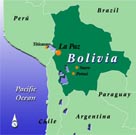ROUNDUP: State of siege, more violence in Bolivian province Pando
 La Paz - The Bolivian government declared a state of siege Friday in the Amazonian province of Pando after days of violent clashes that have left 14 people dead.
La Paz - The Bolivian government declared a state of siege Friday in the Amazonian province of Pando after days of violent clashes that have left 14 people dead.
Bolivian Defence Minister Walker San Miguel said the move - which forbid civilians from carrying arms, restricts the freedom of assembly and increases the powers of the military and the police - was adopted in an effort to contain a wave of violence in the area that broke out Thursday.
Meanwhile, both sides said Friday they wanted to restore dialogue to discuss differences over regional autonomy and government redistribution of wealth that are behind the clashes. Left-wing President Evo Morales and the opposition governor of the province of Tarija, Mario Cossio, met at the presidential palace in La Paz.
"The first task is to pacify the country, and we hope to agree with President Morales on that. Our presence has to do with that clear will to lay the foundations and hopefully launch a process of dialogue that ends in a great agreement for national reconciliation," Cossio said just before the meeting.
On Friday, at least five people - three civilians including a reporter, and two members of the Bolivian security forces - were injured as the military reclaimed control of the airport at Pando's provincial capital, Cobija, medical staff said at the city's public hospital.
An initial report said one person was killed in the clashes at the airport, but neither medical sources nor police or military officials confirmed the report.
According to media reports from Friday, the number of dead in Thursday clashes between supporters of left-wing Bolivian President Evo Morales and followers of Pando Governor Leopoldo Fernandez was as high as 14. Forensic reports showed that all had suffered bullet wounds.
The clashes happened near the town of Porvenir, some 1,200 kilometres north of La Paz. The dead were reportedly 13 peasants who supported Morales and one official of the governorship of Pando.
The opposition alliance - which controls the provinces of Santa Cruz, Beni, Pando and Tarija - is demanding the return of funds raised through a tax on natural gas, which the central government currently devotes to financing a pension for all citizens over 60.
They also demand recognition for regional autonomy statutes that voters in the provinces approved earlier this year, but which the left-wing populist Morales has so far considered unconstitutional. The demands also include changes in the draft for a new national constitution and talks on economic questions, among others.
Morales has made it clear he is willing to discuss autonomy and the tax on the extraction of natural gas.
A major factor behind the conflict between the wealthy descendants of European immigrants and the country's impoverished indigenous majority, led by Morales, are the government's attempts to redistribute wealth.
The Bolivian opposition has turned the pro-autonomy movement in several of the country's regions into a tool to attack the government.
Since the beginning of the year, citizens in four provinces have approved referenda by large margins for greater autonomy from the national government, which would grant them control over key natural resources, including natural gas.
The government's opponents accused Morales, who was elected in 2005 as the country's first indigenous president, of carrying out discrimination in favour of indigenous people.
In August, Morales survived a recall referendum with some 67 per cent of the votes in favour of him staying.
However, the crisis has escalated in recent days.
On Wednesday, Morales ordered US Ambassador Philip Goldberg out of the country. Venezuelan President Hugo Chavez also expelled the US ambassador there in solidarity, while the United States reacted by expelling the ambassadors from both South American countries.
There was violence - including looting and attacks on police - in Pando, Santa Cruz, Tarija and Beni.
Opposition supporters also temporarily interrupted gas pipelines to Brazil, Argentina and the western regions of Bolivia, overpowering security and turning off supply.
Coca farmers, who traditionally back Morales, set up roadblocks to interrupt supply to the opposition-controlled regions, which have been protesting for the past two weeks against the national government's use of taxes.
Bolivia has a population of 10 million. Around 60 per cent live in poverty, most of them Indios. (dpa)